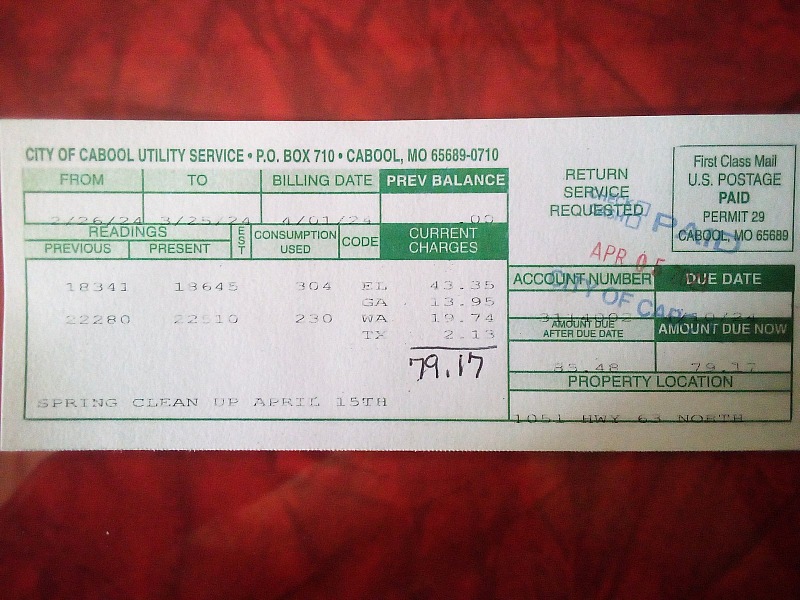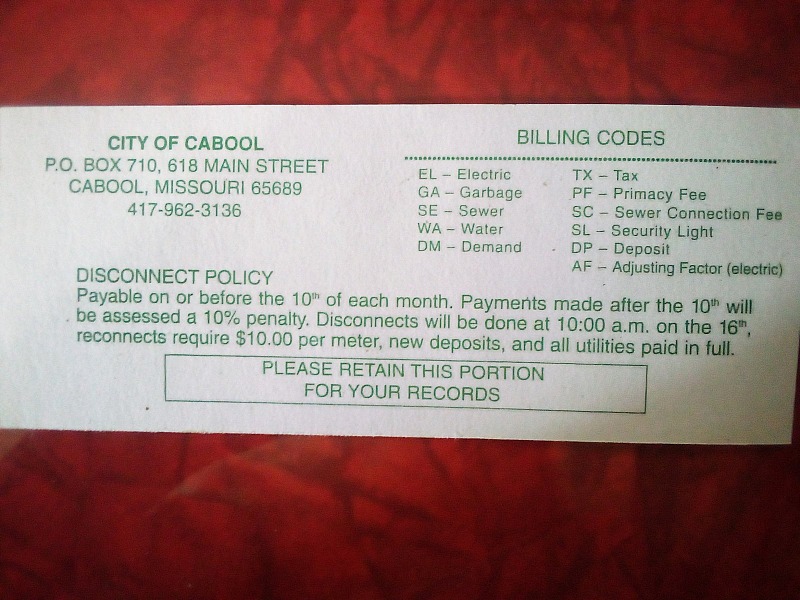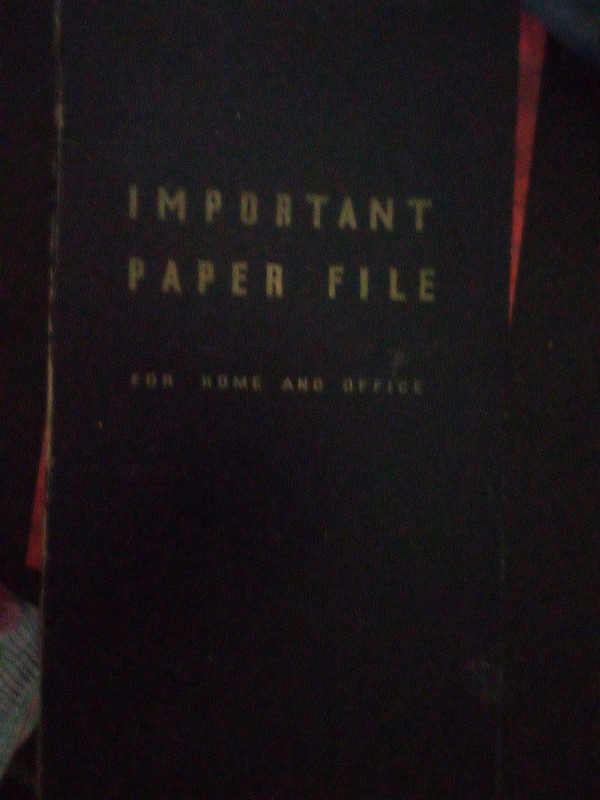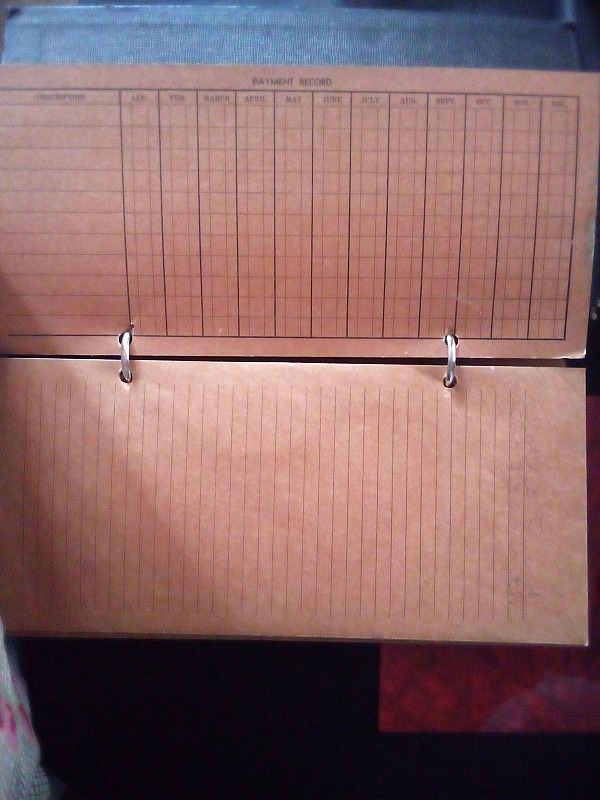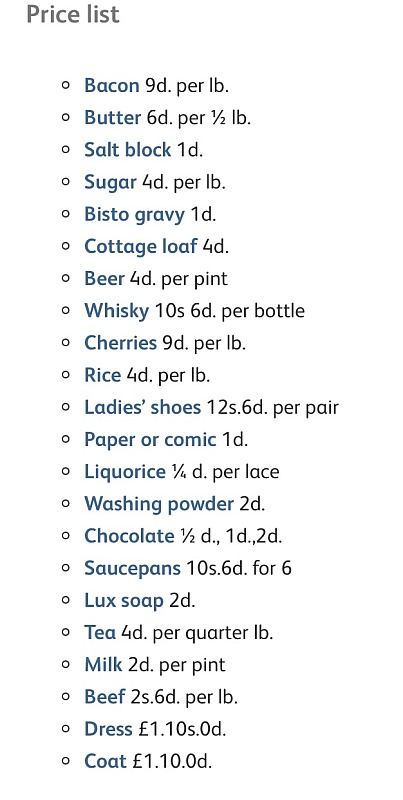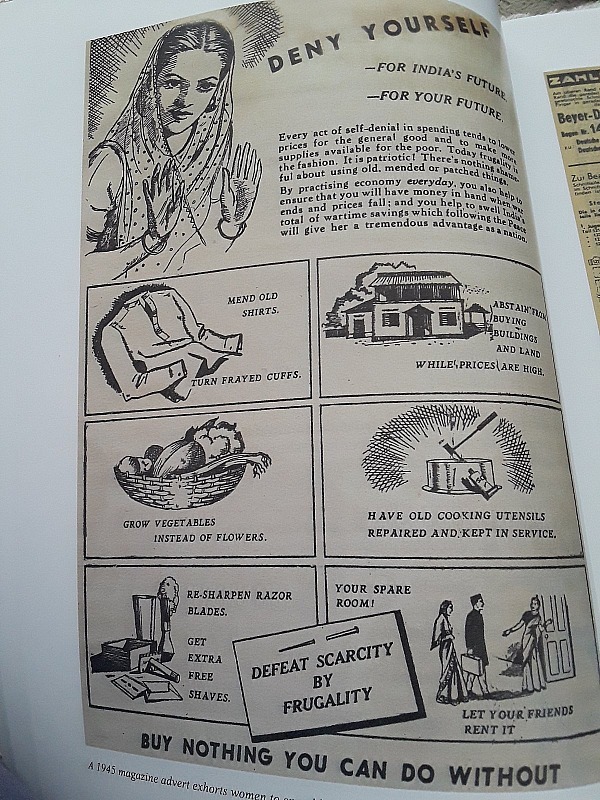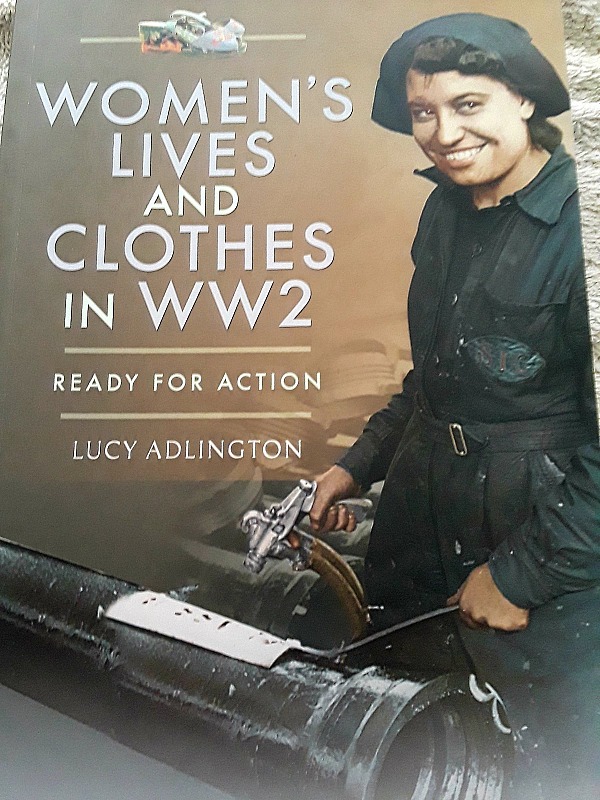Comments On Article: The 1940 Budget In The Year 2024
If you would like to share your comments for article The 1940 Budget In the year 2024, this is where to do it!
Click the Reply To This Topic button below to post yours.
In the early 80’s I began listening to a Christian radio station and they featured a financial advisor named Larry Burkett that got me started using envelopes and I credit him with the success we’ve had living a good life within our means. I have tried to share it with my daughter and anyone that wants to listen
I have never been able to commit to an envelope system…. Mainly because all my checks are direct deposit and the bank is 45 mins away…. But I think I could create a way to participate without having to make an extra trip.
Matty we get enough cash once a month to put up for gas and groceries . I really only use our checking account once a month when deposits are made and then I use a ledger recording what will be dispersed including savings. My husband and I each move our allowances to our individual accounts and then everything is done
Matty,
We’re in the same boat. Therefore, we place kids play money or Monopoly money into envelopes but treat it as if real. Each receipt goes into the envelope and we take out the appropriate amount of money.
Heather, that's a brilliant idea!
Grandma Donna wrote, Oh I can see we are going to have some good ideas.
this is enough to give me a headache! I find it interesting that I do not run a stove, air conditioner, lights,dishwasher, washer/dryer during 4-7 (which is peak) yet it shows a pretty high rate. And we have my son at college so it's less people. I use budget billing, so I tend to get about two months prepaid of service. Meaning I choose when not to have a bill to pay because there is surplus. Yes, I know, it's "free money" to them BUT let's face it, it is pennies in interest if that (I don't pay bills from my high rate accounts due to the set up) and come Dec and Jan I can be free of this bill. Works well for me right now. FOR REFERENCE: I am home all day. I do not run air conditioning until after 7 pm and turns off at 8 am. We are in Central Arizona. House is 2800 sq feet with 12 foot ceiling throughout house. We have been over 100 for most days since beginning of june and all of july until two days ago. Even night temps have been over 65 which is high here. I do cook all meals from scratch so oven, mixer, water heater, stove used during day. I run ceiling fans in main rooms while I am in them. THIS IS ONLY ELECTRIC, our gas is another company. It is also lower per kwh in winter. I tried getting the amount per kwh but it doesn't show. The average temp outside was 37 degrees, and in January 2024, we used 925 kwh. It said we spent $4.40 per day average for electric then and now $4.79. But seems fees have greatly increased. We are a bit higher per kwh because of location I think? We are up a mountain. My daughter lives in an expensive area down the mountain and I tried to see her kwh and it said 11-13 cents. Which surprised me being where she is located everything is expensive.
Hi Donna, It's Dee out here in Colorado. We have used an envelope system for over 15 yrs. We used to do almost all categories. After a few years, and also after we reached our goal of being out of debt except the mortgage, we adjusted the envelopes to the basic things we use cash for daily or weekly. Such as: Groceries, Date money (yes we still budget for date night 2x a month, and 2x a month we go out for breakfast at a little cafe in town), Clothes, Pet care, Personal care (hair cuts, etc), Blow money for my husband to have cash in his wallet to spend as he pleases, and household expenses that are not large purchases (lightbulbs, packing tape, garden hose etc). I also have a meat envelope that I tuck away a little from the grocery budget each month, so we can buy beef in bulk once a year.
We put the other things into a savings account and I keep a binder with a page for each category. These still are envelopes, but I keep the cash in savings. A page for Christmas/gifts, auto expenses (oil changes, etc), vacation, dental/dr, utilities (we pay our trash qtrly), wood (we heat by wood stove), entertainment (other then me singing while I cook) etc.
We have a few 'envelopes' in a money market for those "oh geepers, the dishwasher door broke!" type of things. These are rarely touched.
I'm looking forward to this series.
Our electric company charges $0.12 per kwh here in southern Colorado. I wanted to add, they charge a $45 base charge to just have the electricity, and a $2.51 county tax.
Blessings to you and Charles. I just love your hobby.
Dee
Butter here this week where i live cheapest was $6.49 lb..
I went through my recipe books putting an asterisk by recipes that used more than 100g.
Then I had a lightbulb moment. I have done much reading about frugal living, past days etc and one thing that really stuck out was nearly everyone ate biscuits (scones for us) for breakfast, lunches, snacks. They were and are cheap to make. My recipe only uses 1 Tablespoon of butter.
I have noticed how much food has changed since I was a child and even a mother with children at home. We ate plain fare. International foods were not on our radar. Meat and 3 veg was normally dinner and pudding was not every night. Snacks was a piece of fruit or 1 homemade biscuit ( not half the tin). On our sandwiches were spreads, not salad sandwiches with ham or chicken. We were healthy. Breakfast... Porridge or Weetbix.
Has anyone else had this realisation that we've been brainwashed by food companies, cooking programmes etc that has led to la di da meals. The snacks you buy today are rubbish with no nutritional value and people don't realise their bodies are starving from eating this rubbish.
We pay 24c per kilowatt of power in NZ.
On top of that is a charge of $1.54 per day just to have the line coming to your house
On top of that is a 15% Goods and Services tax
The power itself isn't the expensive part. It's all the extras you can't get away from!!
What was the salary of a plumber is those days. Love from the Netherlands
Karen S...I have noticed that too. I am trying to cut back to meat and two vegetables and one starch, either potatoes or a bread for dinners. I don't know what a spread for sandwiches is, could you elaborate. I have been studying the way my ancestors (Scottland and Ireland) ate from as far back as I could discover up until the 1930s and they ate so simple. I have a list of things they ate and ideas on my fridge. My family is loving my study.
Gdonna...I am looking forward to the budget. It is so very interesting. We also have just started watching the series. I got the dvd from the library. My whole family so enjoys it (self, husband and 4 kiddos) and we are thinking of how to simplify and live "like that."
Thanks for this informative post! Thanks also to Michelle for sharing her electric bill. It would be interesting to see how much people are spending on electricity and how many kilowatt hours they are using. I posted my recent bill below. Mine is for electricity, water, and garbage. I don't use AC so I spend less.
I also posted pictures of my very vintage budget book. It has brown envelopes inside where I put the cash for each category.
I look forward to hearing more about budgeting and what others are doing as well.
Becky Sue
Christina A
A spread is jam, honey, peanut butter,Marmite
Occasionally growing up we would have cheese or egg as a treat. When the Summer veg were in the garden of course there would be lettuce, radishes and tomatoes.
A member of our family had a huge veg garden and apart from.onions Mum seldom brought vegetables AND we never ate fruit and veg that weren't in season.
GDonna... Favourite DVDs.... The Waltons ( am currently watching) and All Creatures Great and Small ( on YouTube)
I feel so peaceful away from this crazy world when I watch them
Karen,
I found something about stretching butter from a WWII cookbook. It is on page 2. The book is Self Help Wartime Cooking Suggestions How To Get The Most From Your Rations. It has a lot of good recipes that could still be used now to save money. I noticed you are from NZ. It has a NZ pudding recipe on page 15.
That is so interesting! Thank you...now I know what a spread is. I was thinking something along the lines of potted meat we have here in the US.
We loved the Waltons, and as soon as we knew it, a lot of people were comparing our youngest to the little red headed Elizabeth Walton girl every where we went. It was so funny because they had never done that before. She just always gets comments on her beautiful red hair. LOL.
Thank you very much Becky Sue K.
That's a brilliant cookbook. Will be perusing it at length.
Is that really $35 and $50 for the barber/hairdresser?! Or am I reading that wrong? It costs almost $35 now for my son to get his hair cut at Supercuts and that’s a big expense for us in 2024! I’ve tried cutting his hair but he ends up looking pretty bad so I gave up. Thank you! I love seeing all the research you do
Grandma Donna wrote, Thank you all for commenting and those of you that are sharing your electric bills.
Ingrid V, I do not have any information for the Netherlands, but I do have a Plumber in California that made $1,320 for a entire year. Another plumber made $1,400 and worked 52 weeks per year 60 hours per week. Then another made only $700.
Dawn R 2 A beautician from California made $1,700 for the year working 52 weeks per year 44 hours per week. A Beautician in Alabama worked 52 weeks per year and 30 hours per week and made $720.00 per year. Also it had to do with how many hours they worked per week or what state they worked in.
Becky Sue K, that is a nice budget book with envelopes.
Thank you Dee for commenting.
Karen S, thank you for letting us know what electricity cost there in New Zealand. You are right about all the added extra charges.
Karen S, your post made me smile as yes, our sandwiches were always made with either honey or jam if you wanted sweet or marmite if savoury, occasionally we would be offered fish or meat paste as a treat! Ham, cheese or egg were for more special occasions and served with a simple salad rather than between two slices of bread.
Have just checked my last electric bill for June and we paid £74 for 241 kilowatts of use, spread across the two day & night readings. This is for electricity only as our cottage is heated by oil during the winter months. The costs of energy have really spiked over the last couple of years here in the UK and a large proportion of people’s income is used up in energy costs
Budget wise we still use cash for groceries and petrol but so many of our bills are now taken out as a direct debit from our bank account it’s hard to use an envelope system for those. This is has been driven by the banks who have closed thousands of branches across the country to encourage people to go ‘cash free’. The wisdom of this was shown up recently when we had the software outage and most stores were cash only!
I do however have a savings account running alongside the current one and an amount is transferred over each month for all expected bills such as heating oil, car maintenance, tax and insurance, house insurance, house maintenance, garden supplies, clothing and pet costs. I keep track of all spends in these categories and a final yearly amount added up which, together with a % increase built in for inflation, gives me an idea of how much I will need for the year coming.
I like the series The Wartime Kitchen and Garden, and the book which give more information. The Wartime Farm series is on YouTube too. I think a spread would have been Gentleman's Relish, or homemade fish or meat paste. Landgirls were allowed an extra ration of cheese but grumbled frequently about getting nothing but beetroot in their sandwiches. In spite of rationing, fair shares for all, men were served larger portions of meat for their dinner.
The family records show a lot of money spent on new clothes. Here in June 1940 clothing companies were ordered to reduce production for the public by a drastic 75% of 1939 sales. Purchase Tax was introduced in 1940, starting at 33.3%, 66.6% in 1942, and increasing to 100% Clothes rationing by points was introduced in 1942, as was tax-free, Utility Clothing, reducing the number of designs and simplifying them, to make production more efficient. People were encourage to Make Do and Mend, and for growing children there was a used clothing exchange scheme.
We are having a year of not buying new clothes, I have bought a vintage waistcoat and a warm wool coat, which needed no clothing coupons.
£1 in 1940 is about £70 in 2024.
Novels of the time are full of grumbles about the increasing cost of everything, and the rises in income tax due to the huge financial cost of the war.
Prices of essentials were controlled. I found a list of prices at the Co-op store for 1939
I have been keeping a pretty strict accounting of my budget for years. I started with a simple paper ledger but now I use a Google spreadsheet which works better for me. I like it as I have it on my phone as well as my laptop so if I am out and spend some $ I will enter the amount I spent as soon as I get into the car. a few years ago I added columns for notes on what was going on in the world (I.e. Covid, high inflation, etc.) and also columns for notes on purchases. I don't list individual grocery items but will list exactly what I bought for the house or what a repair was or what the vet expense was for, etc. Those notes are incredibly helpful when I want to look back to compare prices or just see when I had something done.
In truth I almost never work with any cash anymore but I am still extremely disciplined in my spending, saving approximately 25% of my income and often more. I think that because I work with spreadsheets constantly in my day job, the numbers on the page are actually more real to me than the dollars in my wallet.
One of the things that I have noticed over time is that when I have a mental or physical list of things I want to purchase I used to have a tendency to overspend the monthly budget because I was out and about and it seemed easier to get the item at the moment because I was in the store or placing an order for delivery. That may have seemed more "convenient" and didn't necessarily overspend by very much; however it will lead to debt and paying interest very quickly. So I just needed to become much more disciplined about only spending $xx a month on any category of item. This of course makes prioritizing purchases and planing ahead very critical. This month I am having a large family gathering and wanted to get a few extra things like a folding table, chairs, etc. I planned the spending over 6 months and got whatever was needed a bit at a time never going over budget. This also makes the influx of items less overwhelming to me so the house stays calmer : ) Most things can wait a month or two with proper planning and if they really can't (repair, medical bill, etc.), that is what the emergency fund is for.-- I take care of the bill and then prioritize repaying my emergency fund over any other spending until it it caught up. I have been living this way for at least 20 years and it has made a huge difference to my overall net wealth and my peace of mind.
I recently decided to get a baritone uke so that is on the budget for Dec :) If I still want it then, the $ is in the budget plan!
We have just changed our energy supplier to save some money. The company put our bill up because they want to hold several months payment in advance. There is a standing charge of 30p a day for gas and 60p a day for electricity, £328.50 a year, which is a large proportion of the bill if you can’t afford much energy. There is tax too at 5%
In 1940 in Britain coal and coke provided much of the heating, hot water and often the cooking too. Prices had risen by 40% in the late 30s and were fixed by the Government from 1939.
Grandma Donna wrote, this is very good and interesting information you all are posting here in the forum, it is like we are drawing a map of sorts that will be starting to make sense soon. Pretty soon we will have a sense of where everyone needs to move too so we can all be together in our affordable place, especially with us using our frugal methods. :)
I also have direct deposit for my income and pay most of my bills inputting the payment requests through my bank's bill paying system, so although I've contemplated cash envelopes, they won't work for me. In addition, I don't have local places to pay most of my bills with cash, including phone and electricity, and I usually fuel up my car at Costco, where cash is not accepted. I think envelopes are useful for the things one CAN pay with cash, such as groceries.
I have very few bills that are automatically drafted from my bank account, because I know several people who ran into great difficulties in getting an automatic bank draft stopped when they stopped using the service or switched to a different provider.
I have tried a computer spreadsheet, a budgeting app, and a handwritten ledger (my preference) to keep my spending and income in, and I get the same result. I'll keep it up for a while, then grow tired of noting every single purchase or forget purchases, and before I know it, have nothing entered for several weeks at a time. I'm going to try again for August.
I will have to look, but I think my cost per Kwh is 0.14, and we don't have peak and off-peak hours.
Christina A. Could you share some of your two vegi's per meal? I have been trying to simplify this part of meal planning, and some vegi's are expensive. Thank you so much!
Hello to Grandma Donna and all,
Here in Australia my energy prices are as follows -
Similar to Karen S. in NZ we pay 10% GST (sales tax) on our bills.
All households in our state are currently receiving a $1000 credit from coal royalties to help with the cost of living so our last bill of $660 was free with money still in credit for our next bill.
I don't use an envelope system but I do withdraw money each week for my groceries and try to save as much as I can from it to stock up on household essentials when on sale.
Speaking of spreads, we also had much plainer fare growing up. Toast and spread or cereal for breakfast, a sandwich and a piece of fruit for lunch and meat and 3 veg for tea.
My dad would call in and buy some ham off the bone and fresh bread before visiting my Aunty Pat. She grew fantastic tomatoes and ham and tomato sandwiches were a real treat. We'd also have ham, cheese and maybe a hard boiled egg in summer with salad for tea if it was too hot for mum to cook dinner. Life was much simpler then.
I'm curious, with the envelope system, what do people do when there's "leftover" money at the end of the month?
For example, if you budgeted $50 for groceries but only spent $40, would the remaining $10 roll over so you can spend a total of $60 next month? Or would you take that $10 out and give it to charity? Or just top the envelope back up to $50? That part has always kind of confused me when I hear about the envelope system.
Grandma Donna wrote, Tea S, your question is you budgeted $50.00 for groceries and only spent $40.00. What do you do with the leftover. First remember this is your budget, each person has different expenses. So your example you have $10.00 left in your envelope. Our goal is to build savings as we need that to grow that money for many reasons. We hope for a good savings by the end of the year.
You can leave that money in the envelope for a month but you do not want to spend $60.00 the next week because your budget is $50.00. At the end of a month you tally your money to see how you did and then if you still have this leftover, more or less then apply it somewhere else because once you set your budget you stick with it if at all possible.
What Charles and I do is for something like groceries, if we have left over money at the end of the month, we remove that money and put it in another envelope that we are growing. This is for something that we are needing to purchase and we are saving for this purchase. Or something that needs to be repaired and we do not have enough in that repair fund so we add to that.
Every extra leftover we had the last several years went into our roof fund so we could get a new roof and happily we did just that.
We have a tire fund and tires are very expensive now. We need an envelope or savings to be able to have the money to get new tires when we need new tires.
We already purchased the new tires with our envelope money this year so right away, we calculated what those tires cost and figured in that they will cost more the next time purchase tires so we adjusted that amount. Our tires were $900.00 so we want to save $1,000.00 (possibly more) for the next time we need new tires. Considering Charles driving for work and other factors we figure we will possibly need tires in five years. There are 12 months per year so we multiply 12 months times 5 and we get 60. So we have 60 months to save the $1,000.00 . So we take our tire envelope and each month we put $17.00 and do this for five years and we will have $1020.00 for new tires.
Like Michelle K said up above your post is that she withdraws money each week for groceries and she tries to save as much as she can to stock up for essentials. So anything you save in this grocery fund can be applied to something else. That is designated money and if you don't spend all of it use it for another need.
When we started the envelope system it changed our lives, we got out of debt and we do not charge for these expensive things because we already sat down and figured this in way in advance. We must look ahead and think about the things that come up that we have to pay at least on a yearly basis. I will go more into this in a blog post soon. Donna
Thanks for the response, that makes sense.
I am semi-retired & do not draw any retirement money yet. I work part-time & use the interest from a brokerage account to pay bills. I do receive a very small amount per month from a pension at a hospital I worked for. This is 201$ (USD) per month. I have never used the envelope system. I charge everything & pay the bill at the end of the month. I can look back at the charges on the CC bills to see what I spend. I am very disciplined & do not buy things I cannot afford. I used to write checks to pay bills but it is easier to charge & pay one bill at the end of the month. I also accrue hotel & airline points that I can use to travel for nearly free. I like getting something of value for paying bills I would pay anyway. One CC earns $ to buy clothing at a certain store I shop at. I never carry a balance on my CC. It takes self-disciple to not overspend on CCs. Some people get into CC debt so my method may not work for them.
Yes tires are expensive. I paid 700$ (USD) last year for a set of 4.
TY Gdonna for going over all the budget journals & researching the value of things in 1940. It is very interesting.
Wow, what a great post and all the wonderful comments! I'll be studying them all in detail.
My grandmother introduced me to the envelope system when I was a little girl. She used it all her life and managed to have a small retirement house built for cash when my grandfather retired. He was 60 and she was 55. My grandmother was the most frugal yet stylish, capable woman I ever met! I've started writing down all her frugal lessons so I don't forget and implement more of them. :)
I wanted to share an image found in a book I bought a couple of years ago. I thought y'all might find it interesting. The book is about Women's lives and work clothes during WWII. I like this because it is a practical example of fashion and things we can make use of now. (it is not just military uniforms, but all kinds of work clothes)
I'd have to look at our electric bill a little closer. We hardly run our ac and when we do we keep ot higher than most. Since we are at our shop all day most things are turned off here at the house. I know we lay an avg of $175 a month at the house because everything is electric. In the winter which is most expensive for us we come home and light a fire in the fireplace and turn off the heater till late that night. If it's going to be really cold we will come home earlier and do so.
We have used a budget since our first month of being married over 20 years now. We have used the envelope system since September 2016. We have no personal debt like credit cards and don't even have a credit card to be exact. I withdraw all our money for groceries and keep it in an envelope. Most of our bills are automatic withdrawn to save money as discount for places such as insurance. We get paid...well we pay ourselves since we're self employed once a month and I pay everything that day.
If I have grocery money leftover even $7 I keep it in there and use that to stock up on meats, flour or add to my canning budget. Some months I barely touch the food budget and other like canning season it's a lot since produce is in. I keep track of all the amounts of where and what I spend. All done in a record book that's paper.
Expenses for tires, gas etc all come out of our business budget which I treat the same way, but we don't keep cash on hand due to the amount and all is paid online. We have been able to on the last 5 years pay off extremely expensive equipment quicker, ride thru very slow times, etc and still be in business. Our equipment is equilevlent to buying houses. It's just an industry thing and that's on the low end for cost. We have paid off and paid cash for vehicles even newer ones to us because of saving.
One time we were in a very hard time couple of years ago and it lasted for 9 months because our industry did a bunch of layoffs which was un heard of. We lived off what food we stored for the most part, sold everything that wasn't meaningful as we call it including our kitchen table. Our table paid for 2 weeks worth of gas for us. We were able to not have anymore debt and have continued to live the same way since. We never had a lot of stuff anyways, but it shows what kind of sacrifices you can make if desired.
Hi GDonna from South Eastern Australia! Temperatures here usually range from around -5°C (23°F) to 36°C (97°F) throughout the year.
We have 5 acres on the outskirts of a village.
Electricity costs Aust $0.37688/kWh (US $.025; GB £0.20); supply charge is Aust $1.670150/day (US $1.10; GB £0.86)
Our March to June bill was Aust $1,290.79. Time to get rooftop solar panels! It will take us about 5 years to recoup the cost.
Rooftop solar is very popular here in Australia
Our household has two petrol generators to run the pump and fridge during outages, which happen a few times a year.
Our water is all collected from the roof and all wastewater treated on site.
Heating from March to October is via a slow-combustion stove, which I can also use for cooking and for drying the washing.
I will make some heavy curtains and pelmets this coming year. We did this in our last house. Together with well insulated walls and ceiling, and strategic planting of trees, they made for a comfy home that was cheap to run.
Houses here are not designed well for the climate. Energy providers rip off consumers. It's best to be as self-reliant as possible (even if only to spite the power company)!
Thanks for your wonderful blog and the community that you've created. I too love the old ways and find it calming to spend time with you all.
Best wishes from Kellie

Loading more pages
NEW! Join the mailing list to get email notifications when new articles are posted to our site.
Thank you for joining!
IMPORTANT!
You were sent an email to confirm your subscription to our mailing list.
Please click the link in that email to confirm or you won't be added.
If you have not received the email within a few minutes please check your spam folder.

